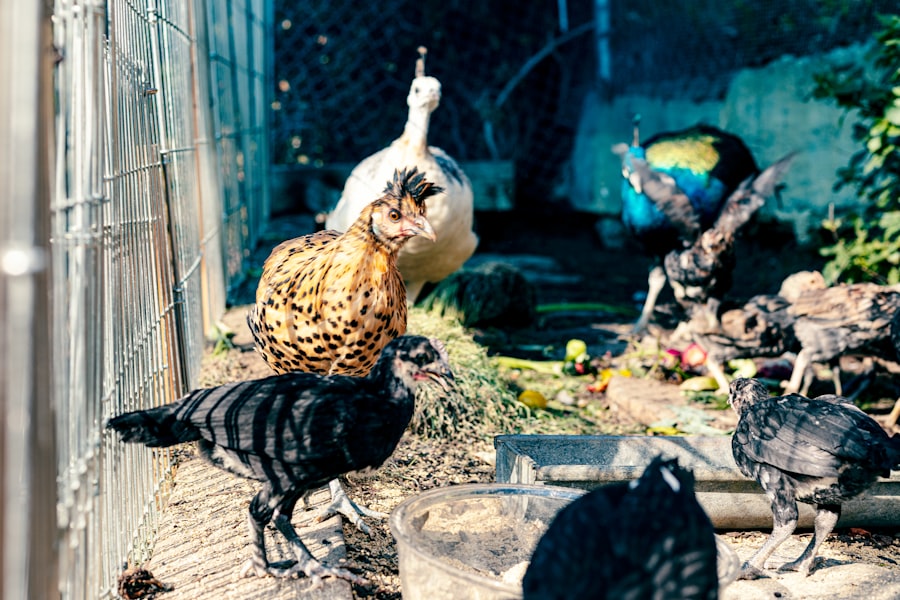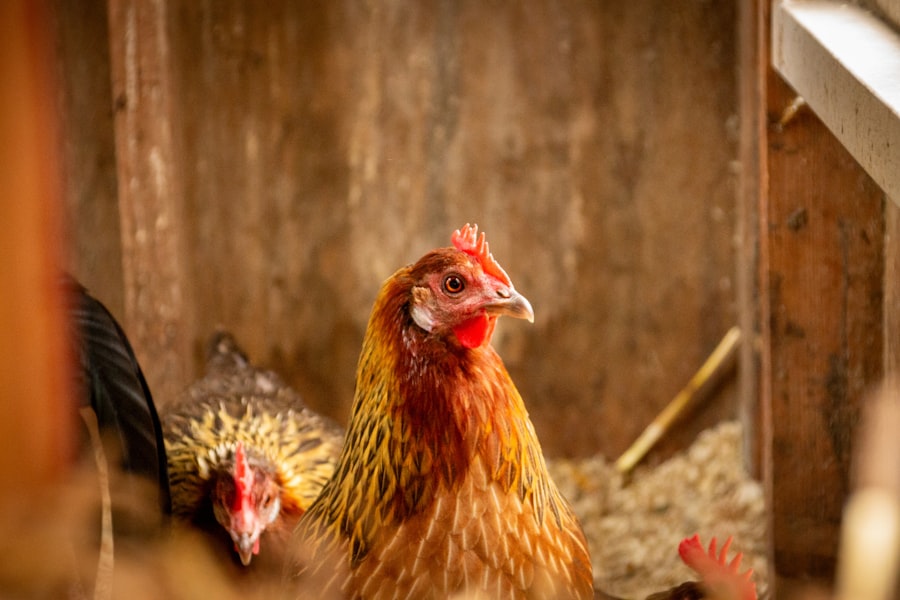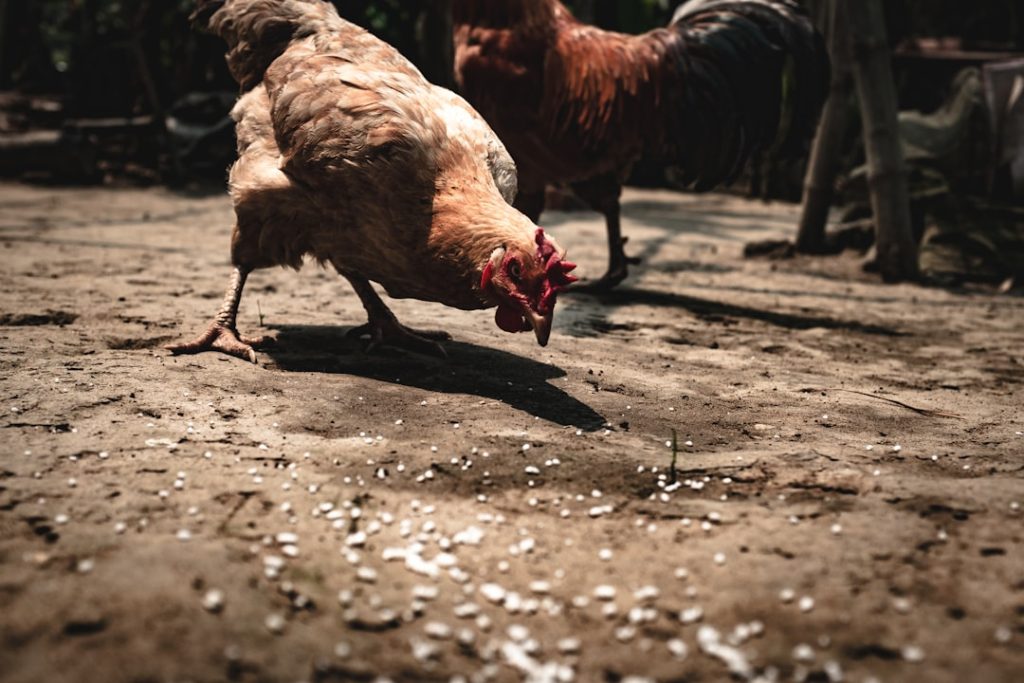When selecting breeds for backyard chickens, several factors should be considered. Climate is a crucial element, as some breeds are better adapted to cold weather, while others thrive in warmer conditions. The intended purpose of the chickens is also important, whether they are primarily for egg production, meat, or as pets.
Different breeds excel in various areas, so research is essential to align breed characteristics with specific goals. Popular backyard chicken breeds include Rhode Island Red, Plymouth Rock, and Leghorn, known for their egg-laying capabilities and ease of care. For dual-purpose breeds that provide both eggs and meat, Sussex and Orpington are viable options.
Ornamental breeds like Silkie or Polish can add aesthetic value to a flock. Climate adaptability, egg production, meat quality, temperament, and space requirements are important factors to consider when choosing chicken breeds. Some breeds are more cold-hardy or heat-tolerant, while others may require additional protection from extreme weather conditions.
Egg production varies among breeds, with some laying more frequently or producing larger eggs. Meat quality and growth rate are important for those interested in raising chickens for consumption. Temperament can affect how well chickens interact with humans and other animals.
Space requirements differ among breeds, with some being better suited for smaller backyard coops. Ultimately, the ideal breed selection depends on individual needs, preferences, and local conditions. Thorough research and consideration of these factors will help ensure a successful and thriving backyard chicken flock.
Table of Contents
- 1 Providing Adequate Shelter
- 2 Creating a Safe and Secure Environment
- 3 Feeding and Watering
- 4 Health and Veterinary Care
- 5 Managing Waste and Cleaning
- 6 Integrating with Other Yard Activities
- 7 FAQs
- 7.1 What are free range chickens?
- 7.2 What do free range chickens need to thrive in a yard?
- 7.3 How much space do free range chickens need in a yard?
- 7.4 What should I feed free range chickens in my yard?
- 7.5 How do I protect free range chickens from predators in my yard?
- 7.6 Are there any local regulations or ordinances I need to be aware of when keeping free range chickens in my yard?
Key Takeaways
- Choose chicken breeds that are suitable for your climate and purpose, such as egg-layers or meat producers.
- Provide a secure and well-ventilated coop with nesting boxes and perches for your chickens to roost on.
- Ensure the coop and yard are predator-proof with fencing, locks, and regular inspections for potential entry points.
- Feed your chickens a balanced diet of commercial feed, kitchen scraps, and access to fresh water at all times.
- Schedule regular health check-ups with a poultry veterinarian and keep an eye out for signs of illness or injury.
- Implement a regular cleaning schedule for the coop and yard to manage waste and prevent the spread of disease.
- Integrate chicken-keeping with other yard activities, such as gardening and composting, to create a mutually beneficial environment.
Providing Adequate Shelter
Coop Size and Ventilation
When it comes to building a coop, there are a few key considerations to keep in mind. First, you’ll want to ensure that the coop is spacious enough to accommodate your flock comfortably. Each chicken should have at least 2-3 square feet of space inside the coop, with additional space in the outdoor run. In addition to size, ventilation is also crucial for a healthy coop environment. Proper ventilation will help regulate temperature and humidity levels, preventing issues like mold and respiratory problems.
Roosting Space and Nesting Boxes
It’s also important to provide adequate roosting space for your chickens, as well as nesting boxes for laying eggs. This will ensure that your chickens have a comfortable and secure environment to roost and lay eggs.
Predator-Proofing Measures
Finally, be sure to consider predator-proofing measures such as secure latches, sturdy fencing, and even buried wire to prevent digging predators. By taking the time to design and build a well-constructed coop, you can ensure that your backyard chickens have a safe and comfortable place to call home.
By investing time and effort into creating a secure and comfortable environment, you can ensure that your chickens thrive and flourish in their new home.
Creating a Safe and Secure Environment

In addition to providing a secure coop, it’s important to create a safe and secure environment for your backyard chickens in the outdoor run as well. This means ensuring that the fencing is sturdy and tall enough to prevent predators from gaining access. Additionally, consider adding a roof or netting over the run to protect against aerial predators like hawks and owls.
It’s also important to regularly inspect the fencing for any signs of wear or damage, repairing or replacing as needed to maintain security. Another important aspect of creating a safe environment for your chickens is providing ample shade and protection from the elements. This can be achieved through natural features like trees and shrubs or by adding structures like awnings or tarps to the run.
Providing access to fresh water at all times is also crucial for the health and well-being of your flock. Consider installing automatic waterers or providing multiple water sources to ensure that your chickens stay hydrated throughout the day. Finally, it’s important to regularly inspect the outdoor environment for any potential hazards or toxic plants that could pose a threat to your chickens.
By taking proactive measures to create a safe and secure outdoor environment, you can help protect your flock from harm and ensure their overall well-being. Creating a safe and secure environment for your backyard chickens involves several key considerations, including predator-proofing the outdoor run, providing shade and protection from the elements, ensuring access to fresh water, and monitoring for potential hazards. By taking these proactive measures, you can help safeguard your flock and provide them with a healthy and secure outdoor space to roam and explore.
Feeding and Watering
Proper nutrition is essential for the health and well-being of your backyard chickens. When it comes to feeding, it’s important to provide a balanced diet that meets their nutritional needs. This typically includes a commercial layer feed that is specifically formulated for egg-laying hens.
Additionally, offering supplemental treats like fruits, vegetables, mealworms, or scratch grains can provide variety and enrichment for your flock. It’s important to monitor their food intake and adjust portions as needed based on factors like age, breed, and egg production. In addition to feeding, providing access to fresh water at all times is crucial for the health of your chickens.
Consider installing automatic waterers or providing multiple water sources to ensure that your flock stays hydrated throughout the day. Regularly cleaning and refilling water containers will help prevent contamination and ensure that your chickens have access to clean water at all times. When it comes to feeding and watering your backyard chickens, it’s important to provide a balanced diet that meets their nutritional needs, as well as access to fresh water at all times.
By monitoring their food intake, offering supplemental treats, and maintaining clean water sources, you can help ensure that your flock stays healthy and happy.
Health and Veterinary Care
Just like any other pets or livestock, backyard chickens require regular health care and veterinary attention to ensure their well-being. This includes monitoring their overall health and behavior on a daily basis, as well as scheduling regular check-ups with a poultry veterinarian. It’s important to be familiar with common signs of illness in chickens, such as lethargy, decreased appetite, abnormal droppings, or respiratory issues.
By staying vigilant and addressing any health concerns promptly, you can help prevent the spread of disease and ensure that your flock remains healthy. In addition to regular check-ups, it’s important to establish a relationship with a poultry veterinarian who can provide guidance on preventative care measures such as vaccinations and parasite control. They can also offer advice on nutrition, housing, and other aspects of chicken care to help you provide the best possible environment for your flock.
By staying proactive about their health care needs, you can help ensure that your backyard chickens lead long and healthy lives. Maintaining the health of your backyard chickens involves regular monitoring of their overall well-being, scheduling regular check-ups with a poultry veterinarian, staying vigilant for signs of illness, and establishing preventative care measures such as vaccinations and parasite control. By prioritizing their health care needs, you can help ensure that your flock remains healthy and thriving.
Managing Waste and Cleaning

Coop and Run Maintenance
Consider using materials like straw or wood shavings in the coop, which can be easily removed and replaced as needed. This will make cleaning out the coop and run a more manageable task.
Nesting Box Maintenance
Regularly cleaning nesting boxes will also help prevent issues like egg contamination or mite infestations. This is an essential part of maintaining a healthy environment for your flock.
Composting and Disposal
In addition to cleaning out the coop and run, it’s important to properly manage chicken waste by composting it or disposing of it in an environmentally friendly manner. Chicken manure is a valuable source of nutrients for gardens and landscaping when composted properly. By composting or disposing of waste correctly, you can reduce environmental impact and create a nutrient-rich resource for your garden.
Integrating with Other Yard Activities
Integrating your backyard chickens with other yard activities can provide mutual benefits for both your flock and your outdoor space. For example, allowing your chickens access to garden areas can help control pests like insects and weeds while also providing them with additional space to roam and forage. Just be sure to protect any delicate plants or areas where you don’t want them to roam freely.
Additionally, incorporating chicken-friendly landscaping features like shrubs or trees can provide shade and enrichment for your flock while enhancing the overall aesthetic of your yard. Consider creating designated areas for dust bathing or adding structures like perches or climbing structures for added enrichment. By integrating your backyard chickens with other yard activities in a thoughtful manner, you can create a harmonious environment that benefits both your flock and your outdoor space.
Integrating backyard chickens with other yard activities can provide mutual benefits by allowing them access to garden areas for pest control while providing additional space to roam and forage. Incorporating chicken-friendly landscaping features like shrubs or trees can provide shade and enrichment while enhancing the overall aesthetic of your yard. By integrating these activities thoughtfully, you can create a harmonious environment that benefits both your flock and your outdoor space.
If you’re interested in keeping free range chickens in your yard, you may also want to consider breeding ducks. Poultry Wizard has a helpful article on duck mating season that can provide valuable information for anyone looking to expand their poultry collection. Additionally, they offer advice on the importance of a secure coop, such as their snaplock chicken coop, and the best flooring options for your chicken coop in their article on the floor of a chicken coop. These resources can help you create a safe and comfortable environment for your feathered friends.
FAQs
What are free range chickens?
Free range chickens are poultry that are allowed to roam freely and forage for food in a natural environment, as opposed to being confined to a coop or small enclosure.
What do free range chickens need to thrive in a yard?
Free range chickens need access to fresh water, shelter, and a variety of vegetation and insects to forage for food. They also require protection from predators and access to a secure coop for nesting and roosting.
How much space do free range chickens need in a yard?
Ideally, free range chickens should have at least 10 square feet of space per bird to roam and forage. However, the more space they have, the better for their overall well-being.
What should I feed free range chickens in my yard?
In addition to foraging for insects and vegetation, free range chickens can be supplemented with a balanced poultry feed to ensure they receive all the necessary nutrients. It’s important to provide a balanced diet to support their health and egg production.
How do I protect free range chickens from predators in my yard?
To protect free range chickens from predators, it’s important to secure the perimeter of the yard with fencing, install motion-activated lights or alarms, and provide a secure coop for them to roost at night. Additionally, keeping a watchful eye on the chickens and supervising their free range time can help deter predators.
Are there any local regulations or ordinances I need to be aware of when keeping free range chickens in my yard?
Before keeping free range chickens in your yard, it’s important to check with your local government or homeowners’ association for any regulations or ordinances regarding the keeping of poultry. Some areas may have restrictions on the number of chickens allowed, coop requirements, or noise ordinances.
Meet Walter, the feathered-friend fanatic of Florida! Nestled in the sunshine state, Walter struts through life with his feathered companions, clucking his way to happiness. With a coop that’s fancier than a five-star hotel, he’s the Don Juan of the chicken world. When he’s not teaching his hens to do the cha-cha, you’ll find him in a heated debate with his prized rooster, Sir Clucks-a-Lot. Walter’s poultry passion is no yolk; he’s the sunny-side-up guy you never knew you needed in your flock of friends!







